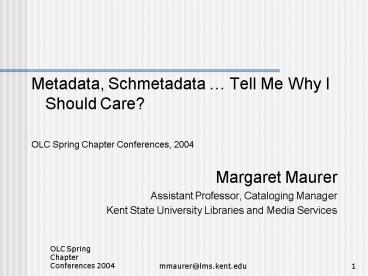Metadata, Schmetadata Tell Me Why I Should Care - PowerPoint PPT Presentation
Title:
Metadata, Schmetadata Tell Me Why I Should Care
Description:
Adapt that standard and document it. OLC Spring Chapter Conferences 2004. mmaurer_at_lms.kent.edu ... Example of metadata that can either be non-connected or embedded ... – PowerPoint PPT presentation
Number of Views:51
Avg rating:3.0/5.0
Title: Metadata, Schmetadata Tell Me Why I Should Care
1
- Metadata, Schmetadata Tell Me Why I Should
Care? - OLC Spring Chapter Conferences, 2004
- Margaret Maurer
- Assistant Professor, Cataloging Manager
- Kent State University Libraries and Media Services
2
Useful Resources
- Metadata Fundamentals for All Librarians /
Priscilla Caplan. ALA, 2003. 0-8389-0847-0 - Introduction to Metadata, Pathways to Digital
Information / Edited by Murtha Baca. Getty
Information Institute, 1998. 0-89236-533-1
3
What is Metadata?
- Data about data
- Machine understandable information for the web
- Data that describes the attributes of a resource,
e.g. its author(s), title, physical format, etc. - A succinct and systematic set of information that
references, and can be used to retrieve
efficiently and accurately, a larger set of
information.
4
Metadata
- Cataloging is metadata, metadata is cataloging
- Metadata can be information stored in ltmetagt tags
in the headers for HTML pages - Library catalogs are metadata
5
2003 OCLC Environmental Scan
- Trends In the Technology Landscape
- Bringing structure to unstructured data
- Distributed, component-based software
- A move to open-source software
- Security, authentication and digital rights
management
6
(No Transcript)
7
Existing Metadata in Public Libraries
- Traditional Library Information Systems
- Community Information
- Directories of agencies and services
- Volunteer opportunities listings
- Events
- Local historical and genealogical information
8
Traditional Library Metadata
- Collection catalogue
- Indexing services (magazines and newspapers)
- MARC centric services
- Purchased content and data management services
9
Local Historical and Genealogical Information
- Newspaper clippings stored in a digital images
database - Indexes of non-digitized material
- Census, wills, property records, military
records, cemetery records, business directories,
maps
10
(No Transcript)
11
Digitization Projects in Ohio Libraries
- Digitization projects use metadata to describe
images - 47 of survey respondents were in some phase of a
digitization project in Ohio in 2001
12
(No Transcript)
13
(No Transcript)
14
(No Transcript)
15
Creating your own metadata
- Define what the resources are
- Describe who will want to access them and how
- Determine what standards exist to describe that
type of resource - Adapt that standard and document it
16
Entity
- An object or thing about which information needs
to be known or held. The resource being
cataloged.
17
Metadata Element
- A discrete unit of data about a resource.
- Elements may be further qualified.
- 15 Dublin Core elements
- In MARC, each field is an element.
18
Attribute
- A category of information about an element or
entity. - Used to identify, qualify, classify or quantify
the element or entity. - A list of attributes is defined for each Dublin
Core element in a particular application file.
19
Metadata Scheme
- A scheme that helps interpret element values.
- Examples can include parsing rules, controlled
vocabularies, or AACR rules or MARC21 - A defined list of elements rules for entering
data
20
Not one size fits all
- No universal metadata type
- Coordination is tighter at the top than where
metadata is being designed
21
Metadata Schemes Define
- Semantics The meaning of the metadata elements
themselves - Content Rules
- Syntax
- Context
- Management
22
Types of Metadata
- Descriptive metadata resource discovery
- Administrative metadata management of resources
- Structural metadata machine necessary
information
23
Descriptive metadata
- Aids in resource discovery
- MARC / AACR
- Dublin Core
- TEI (Text Encoding Initiative)
24
Administrative metadata
- Facilitates the management of the resource
- Controls access to the resource
- Grants Permissions for use
- Rights management
25
Structural metadata
- Used by machines
- Seldom seen by the human eye
26
DC Metadata Application Profiles
- Application profiles
- Formalized definitions
- Identifies controlled vocabularies (if any)
- Human readable information about the application
and usage guidance
27
- Western States Dublin Core Metadata Best
Practices - OhioLINK Draft Guidelines for Digital Media
Center Metadata
28
Metadata crosswalks
- Based on datamapping
- Aid interoperability
- Authoritative mappings
- Generally round-trip mapping is not supported
without data distortion or loss
29
(No Transcript)
30
(No Transcript)
31
Structures for Metadata
- Non-connected metadata (databases)
- Embedded metadata
32
Text Encoding Initiative (TEI) Headers
- Coding for electronic texts
- Example of embedded metadata
- Closely related to ISBD
33
Dublin Core Metadata Initiative
- Example of metadata that can either be
non-connected or embedded - General purpose scheme for resource description
- 15 elements
- Can be qualified
34
Dublin Core (Continued)
- Internationally accepted
- Flexible
- Interoperability
- Too few elements and qualifiers
- Lack of usage guidelines
35
Dublin Cores Purpose and Goals
- To assist in and enhance resource discovery and
description on the web. - To achieve semantic interoperability
- To be recognized as an international standard.
36
(No Transcript)
37
(No Transcript)
38
Metadata and searching embedded ltmetagt tags
- The internet is rife with data, but poor in
metadata - Effective searching requires the ability to find
what you are looking for and the ability to use
what you find.
39
Metadata and searching within a domain
- Search engines that index ltmetagt elements
- Ultraseek
- Berkeleys Swish-E
- Microsofts Index Server
- Blue Angel Technologies
- MetaStar
- Verity
- Livelink Search and Spider
40
The good and the bad of Interoperability
- Lack of a standard format
- Open Archives Initiative (OAI)
41
So, Whats next?
- Indexing Cataloging are needed
- Its our job
- Librarians as tool makers
- Volunteer!
42
- http//www.library.kent.edu/mmaurer/































